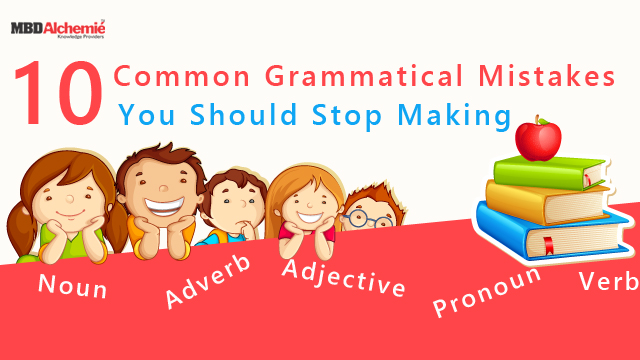We all have learned grammar since our school days, but still many people mess up. At this point of time, when English has become such a necessary language that a person who doesn’t know English is considered as a clown. Making grammatical errors can affect your effectiveness and makes you lag behind in this competitive world. In a professional environment, what you say does matter as much as how you say it. When it comes to English grammar, things can be a lot trickier than they seem.

Here is a list of some common grammar mistakes you should stop doing now.
Less Vs. Fewer – “Fewer” can be used when you are referring to people or things in plural. “Less” is used when you are referring to something that can’t be counted or does not have a plural.
Example : She has fewer apples in her basket.
People want to spend less time in their family functions.
Assure Vs. Insure Vs. Ensure – All these words are so connected that directly or indirectly their meanings are related to “making an outcome sure”. However, they are not interchangeable. “Assure” means to promise, “Insure” means to protect against risk by regularly paying an insurance company and “Ensure” means to make certain and
Example : I assure you that he is a reliable person.
Ensure you know everything about that topic.
I insure my bike because the law requires it.
Since Vs From Vs. For – “Since” is used when you’re indicating the beginning of the time period, “From” is similar to “since”, it is used to indicate the starting point of an action, but it is usually closely followed by other prepositions such as till or until (refers to the end of the action) and “For” is used when you’re talking about a period of time (up to the present).
Example : I know him since 2000.
Her working hours are from 10 to 6.
He has worked here for two years.
Affect Vs. Effect – “Affect” is a verb and “Effect” is a noun. When we talk about the act of changing, we use “affect” and when we talk about the change itself, we use “Effect”.
Example : This weather will affect my health.
That story had a great effect on her.
Complement Vs. Compliment – “Complement” is a word which means, add to something in a way that enhances or improves. While “compliment” means something nice (an expression of praise or admiration) said about someone.
Example : A perfect hairstyle complements a look.
She got many compliments on her farewell party.
Peak Vs. Peek Vs. Pique – This is the most common mistake many people do. “Peak” means a sharp point, “Peek” means taking a quick look at something and “Pique” means to provoke.
Example : Let me take a peek.
John reached the peak of the hill.
It will pique your interest to read more.
Incomplete Comparisons – People generally made a mistake when they compare something and forget to mention what they are comparing to. When you are comparing anything, make sure to clarify what you are comparing to.
Example : My Mobile phone is slimmer and better.
Slimmer and better.. than what?? What you are comparing your phone to?
Into Vs. In to – “Into” indicates movement, while in the case of “In to”, “in” by itself can be an adverb, preposition, adjective, or noun and “to” is a preposition or an adverb or part of an infinitive.
Example : She walked into the room
She walked in to the classroom for the chemistry lecture.
Between Vs. Among – “Between” is used to refer two or sometimes more things that are clearly separated and “Among” is used to refer things that are not clearly separated (part of a group or mass of objects).
Example : They lived in America between 1960 to 1980.
Choose one color among all the shirts.
Alot Vs. A lot Vs. Allot – “Alot” is not a word, in fact it is grammatically wrong. “A lot” means to a large extent and “Allot” means to allocate.
Example : She knows a lot about astrology.
They have allotted a unique number to every student.
Rectify the above errors and try not to make them ever again because good grammar is the key to success!
“Good English, well-spoken and well-written, will open more doors than a college degree. Bad English will slam doors you didn’t even know existed”
